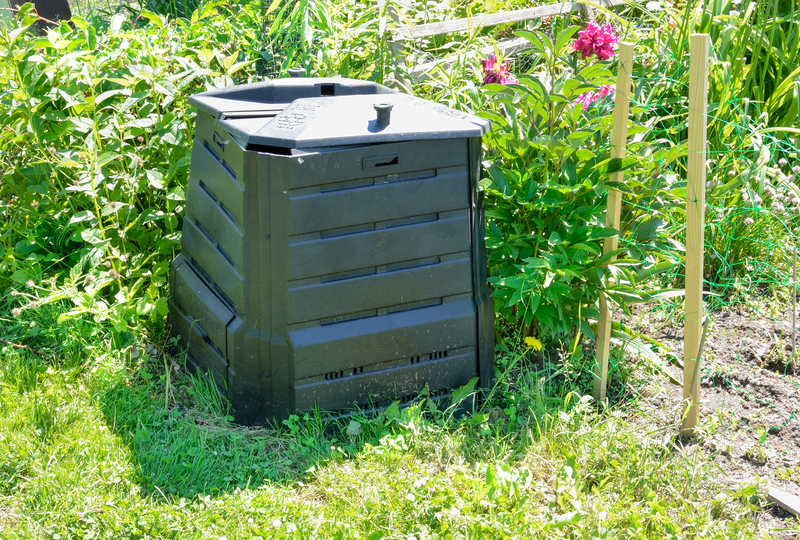Discover How to Excel at Recycling with These Home-Based Tips
Are you enthusiastic about making a positive impact on the environment from your own living space? If so, you're in the right place. Home-based recycling isn't just about tossing bottles in the bin; it's a lifestyle focus that can lead to profound benefits for both the planet and your household. This comprehensive guide will help you discover how to excel at recycling with actionable, easy-to-follow recommendations that can transform your daily habits and waste footprint.

Why Home Recycling Excellence Matters
Each household contributes to the global waste stream, but by mastering recycling at home, you can drastically reduce your ecological footprint. Efficient recycling helps to:
- Reduce landfill waste
- Save energy and natural resources
- Lower greenhouse gas emissions
- Encourage responsible consumption
Adopting superior recycling practices at home is one of the most straightforward yet impactful ways to help heal the environment.
1. Understand What You Can and Can't Recycle at Home
The cornerstone of excellent home-based recycling is knowing what belongs in your recycling bin. Not every item is recyclable, and wish-cycling (putting non-recyclables in the bin) can contaminate entire batches of recyclables.
Commonly Accepted Recyclables
- Paper and Cardboard: Newspapers, magazines, cereal boxes, cardboard packaging
- Plastics: Containers marked with recycling logos (#1 PETE and #2 HDPE are widely recycled)
- Glass: Clear, brown, and green glass bottles and jars
- Metals: Aluminum cans, tin cans, and clean foil
Items to Avoid Placing in Recycling Bins
- Plastic bags and film wraps (take to grocery store drop-offs)
- Polystyrene foam (Styrofoam)
- Food-soiled items (pizza boxes, greasy containers)
- Ceramics, mirrors, window glass
- Batteries and electronic waste (find local recycling programs)
Tip: Always check your local recycling program's guidelines, as acceptable materials can vary from city to city.
2. Set Up an Efficient Home Recycling Station
Designing a dedicated recycling area in your home is crucial for making the process seamless and efficient. Here's how to create a home recycling hub that promotes success:
- Choose the right location: Place bins in the kitchen, garage, or wherever most of your household waste is generated.
- Label bins clearly: Use bold, waterproof labels for each material (paper, plastics, glass, metals).
- Include a compost container: Don't forget to add a separate bin for compostable kitchen waste, if possible.
- Make it accessible: Ensure everyone in the household knows where to find and use the recycling bins.
Pro Tip: Encourage children to participate by giving them colorful, fun stickers for properly sorted items.
3. Master the Art of Rinsing and Sorting Recyclables
Improperly prepared recycling items can cause contamination, which often results in whole truckloads being sent to the landfill. To excel at recycling at home, follow these basic rules:
- Rinse Containers: Quickly rinse bottles, jars, and cans to remove food or liquid residue.
- Remove Caps & Lids: Separate lids from bottles and containers unless instructed otherwise by your recycling program.
- Flatten Boxes: Break down cardboard boxes to save space in the bin and at the recycling facility.
- Keep it Dry: Wet paper and cardboard may become unrecyclable. Store recycling bins in a dry place.
Remember: Recycling is not a "wish and toss" effort; preparation is key to making your efforts count.
4. Compost Organics and Minimize Food Waste
Excelling at home recycling isn't limited to plastics and paper. Organic waste--like vegetable peels, eggshells, and coffee grounds--can be transformed into nutrient-rich compost for your garden. Here's how to get started:
Steps to Compost at Home
- Choose a Compost Bin: Purchase a ready-made bin or build your own from wood or wire mesh.
- Combine Greens and Browns: Layer food scraps ("greens") with dry yard waste, like leaves or cardboard ("browns").
- Aerate Regularly: Stir your compost every few weeks to provide needed oxygen.
- Harvest Finished Compost: In a few months, use the rich, dark compost to fertilize your garden or potted plants.
By composting at home, you'll shrink your garbage output and create something valuable for your living space--talk about a win-win!
5. Upcycle and Reuse Before You Recycle
Practicing the principle of "reduce, reuse, recycle" means finding ways to upcycle household items before they head to the bin. Adding an element of creativity can further reduce your waste output.
Simple Upcycling and Reuse Ideas
- Glass jars: Use as storage containers for grains, screws, or DIY projects.
- Tin cans: Decorate and use as planters or utensil holders.
- Old T-shirts: Transform into cleaning rags or reusable tote bags.
- Cardboard boxes: Reuse for shipping, storage, or kids' craft projects.
Experimenting with upcycling can be fun for the whole family and extend the usefulness of everyday items.
6. Get Smart: Learn About Local Recycling Programs and Rules
One of the best ways to excel at recycling from home is to become an expert in your area's collection rules. This avoids contamination and increases the chances your recyclables are actually recycled.
How to Stay Informed
- Visit your city or town's website: Most municipal websites provide detailed guidelines, including pickup schedules and accepted materials.
- Download recycling apps: Many communities now offer smartphone apps that include alerts, reminders, and recycling tips.
- Subscribe to newsletters: Stay up to date with changes in local regulations by subscribing to environmental newsletters.
Understanding the specifics of home recycling in your own neighborhood will ensure you're always doing your best.
7. Reduce Packaging and Single-Use Waste
Preventing waste in the first place is even better than recycling. By choosing products with less packaging or that are reusable, you can dramatically lower your household's contribution to the global trash problem.
- Shop in bulk: Bring your own containers to bulk stores to buy just what you need, minus the packaging.
- Avoid disposable products: Invest in reusable shopping bags, water bottles, and lunch boxes.
- Choose cardboard over plastic: Cardboard is generally more recyclable and biodegradable than many plastics.
- Support companies with sustainable packaging: Look for brands that prioritize recycled or compostable packaging.
8. Educate and Involve Your Household
To achieve true excellence in home recycling, make it a team effort. The more consistent everyone is, the more effective your recycling program will be.
- Host family recycling nights: Teach kids about sorting and the benefits of recycling with fun games or activities.
- Display recycling guides: Post a simple visual guide near your bins for easy reference.
- Set household goals: Challenge your family to reduce waste or achieve specific recycling targets each month.
Building a culture of sustainability at home not only boosts recycling, but also instills lifelong habits in children and other household members.
9. Recycle Special Items Responsibly
Some materials, such as e-waste, batteries, and hazardous chemicals, require special handling. Never toss these items in your curbside bin. Instead, look for community collection days or dedicated recycling centers.
Where to Recycle Special Items
- Electronics: Many retailers offer e-waste collection services for old phones, laptops, and chargers.
- Batteries: Hardware stores frequently collect lithium or rechargeable batteries for safe disposal.
- Medications: Pharmacies often provide take-back programs for expired drugs.
- Paints and chemicals: Most communities offer household hazardous waste events several times a year.
Take a few extra minutes to ensure these items are disposed of properly--your efforts help prevent environmental contamination.
10. Track Your Progress and Celebrate Success
Finally, nothing motivates like results. Set goals, track your recycling output, and celebrate milestones to keep momentum high. You could:
- Weigh or count the bags of recyclables you divert each month
- Share your achievements on social media and inspire others
- Reward your household when you reach certain zero-waste milestones
Tracking progress makes recycling at home more tangible and rewarding, casting your efforts in a positive, measurable light.

Key Takeaways: Become a Home Recycling Pro
- Know what your local program accepts and avoid contaminating the recycling stream.
- Efficiently sort, clean, and prepare items before recycling.
- Compost food waste and garden clippings to minimize landfill contributions.
- Reuse and upcycle whenever possible to extend the life of household goods.
- Engage your entire household, making sustainability a shared mission.
- Keep learning and stay up to date on best practices and local rules.
Conclusion: Take Action Today to Excel at Home Recycling
By adopting these home recycling tips, you can turn your house into a beacon of sustainability. Remember, every piece recycled correctly and every item kept out of the landfill makes a real difference. It's not just about following a process--it's about building an environmentally conscious lifestyle.
Start implementing these strategies today to enjoy a cleaner home, lower waste bills, and the pride of knowing you're making a positive impact on the world--right from your doorstep.